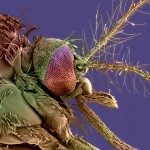Lien vers Pubmed [PMID] – 25058001
PLoS Negl Trop Dis 2014 Jul;8(7):e2994
Replication of arboviruses in their arthropod vectors is controlled by innate immune responses. The RNA sequence-specific break down mechanism, RNA interference (RNAi), has been shown to be an important innate antiviral response in mosquitoes. In addition, immune signaling pathways have been reported to mediate arbovirus infections in mosquitoes; namely the JAK/STAT, immune deficiency (IMD) and Toll pathways. Very little is known about these pathways in response to chikungunya virus (CHIKV) infection, a mosquito-borne alphavirus (Togaviridae) transmitted by aedine species to humans resulting in a febrile and arthralgic disease. In this study, the contribution of several innate immune responses to control CHIKV replication was investigated. In vitro experiments identified the RNAi pathway as a key antiviral pathway. CHIKV was shown to repress the activity of the Toll signaling pathway in vitro but neither JAK/STAT, IMD nor Toll pathways were found to mediate antiviral activities. In vivo data further confirmed our in vitro identification of the vital role of RNAi in antiviral defence. Taken together these results indicate a complex interaction between CHIKV replication and mosquito innate immune responses and demonstrate similarities as well as differences in the control of alphaviruses and other arboviruses by mosquito immune pathways.

